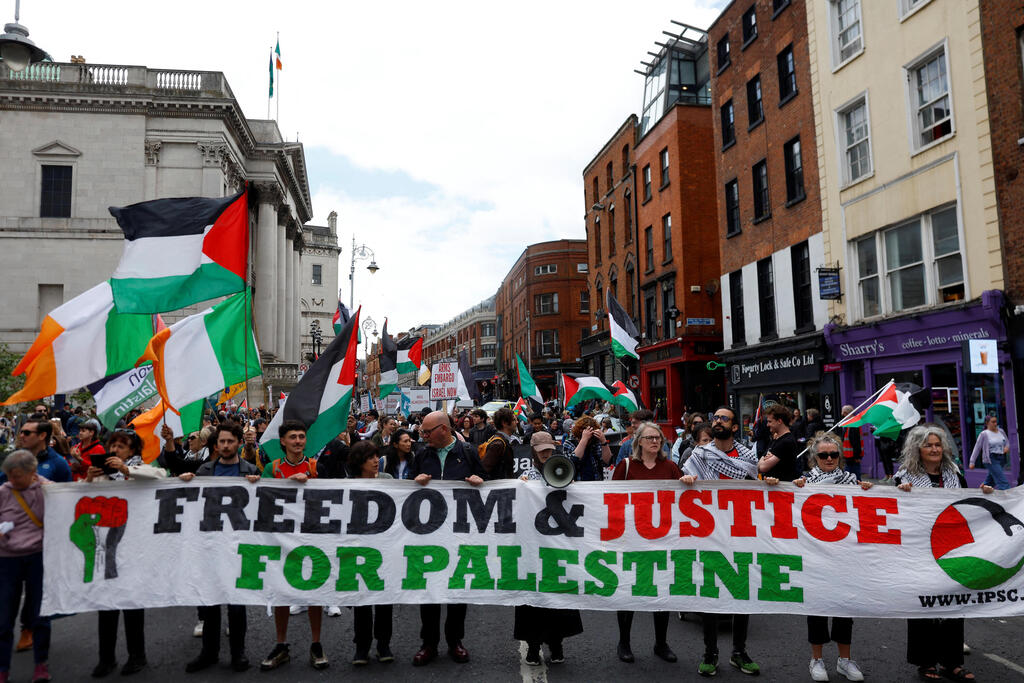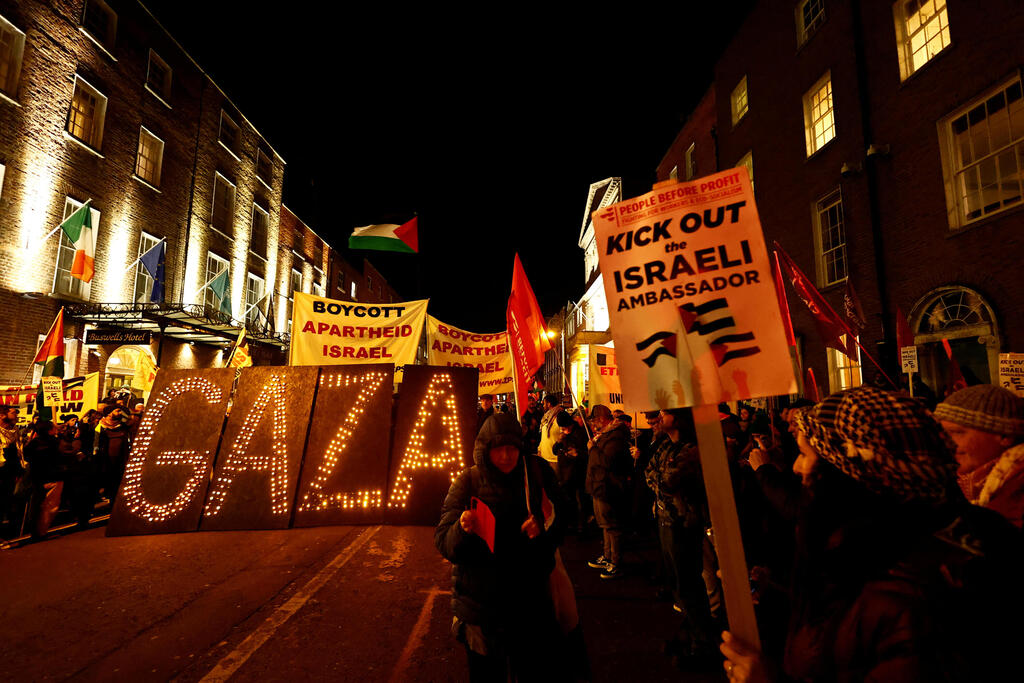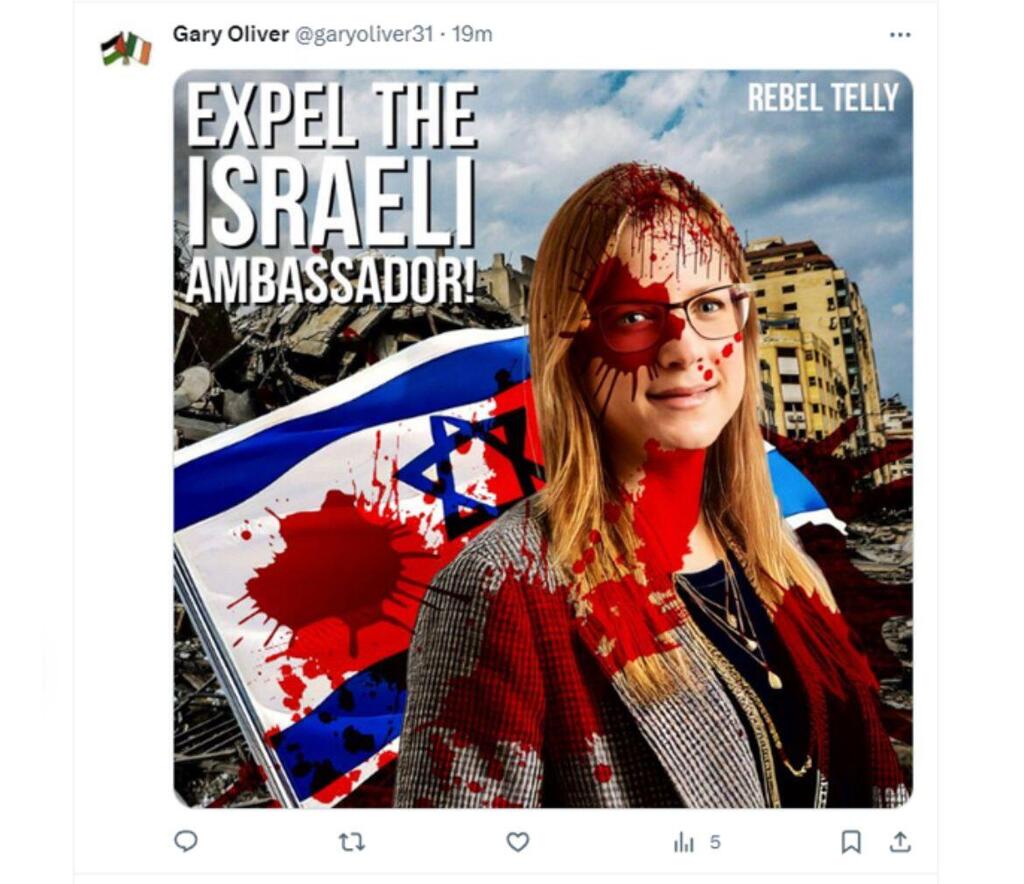Getting your Trinity Audio player ready...
Ireland’s President Michael Higgins accused Prime Minister Benjamin Netanyahu of “undermining the sovereignty of three neighboring countries”—Lebanon, Syria and even, in his words, attempting to ‘establish a settlement in Egypt,’” referring to Israel’s actions against Hezbollah and along the Syrian border.
If that weren’t enough, Ireland has petitioned the International Criminal Court in The Hague to join South Africa’s case against Israel and has advocated for expanding the definition of “genocide” to incriminate Israel.
Ireland’s President Michael Higgins criticizes Israel
(Video: RTE News)
This is not the first time Ireland’s leadership has taken a sharply anti-Israel stance during the war. In November 2023, former Irish premier Leo Varadkar angered Israelis with his comments about the release of Irish citizen Emily Hand from Hamas captivity in a hostage deal. Varadkar described her as “an innocent child who was lost, found and returned,” omitting any mention of her brutal kidnapping by Hamas terrorists.
Ireland’s current Prime Minister, Simon Harris, continued this policy, announcing in May 2024 that Ireland officially recognizes a Palestinian state. Earlier, in March 2024, Irish Foreign Minister Micheál Martin declared his intention to advance the “Occupied Territories Bill,” which would ban trade between Ireland and Israeli settlements beyond the Green Line.
With a population of just 5 million and no active political or military conflicts, Ireland has positioned itself as Europe’s most hostile state toward Israel, despite enjoying domestic economic prosperity since the 1990s.
The deterioration in relations predates October 7 and is rooted in a historical sentiment shared by many Irish citizens, who identify with the Palestinian struggle, likening it to their own violent and nonviolent resistance against British occupation in the past.
"What we’re seeing now—the anti-Israel activity in Ireland—stems from its history,” explains Dr. Maya Sion-Tzidkiyahu, director of the Israel-Europe Relations Program at the Mitvim Institute.
“Ireland was under British rule until 1922 and only gained independence after a difficult struggle. They have a national consciousness that remembers what it means to be an occupied people. The issue of Northern Ireland remains unresolved, where there was friction between Catholics and Protestants, including acts of terrorism against British soldiers stationed there. For the Irish, terrorism and resistance are often seen as legitimate actions for liberation, rooted in their national mythology of ‘freedom fighters.’”
While this historical sentiment can be understood, why does Ireland still cling to it despite the events of October 7?
“It’s true, there’s a sense of losing direction here. The Irish government does not support Hamas but supports the Palestinians, viewing Hamas’ attack as part of the broader context of Israel’s occupation of the Palestinians since 1967. In their view, there’s a context, and October 7 didn’t happen in a vacuum. It’s important to note they don’t justify the attack and, as a member of the European Union, Ireland joined in condemning Hamas.”
How valid is the claim by Foreign Minister Gideon Sa’ar and others that this anti-Israel sentiment has spilled over into antisemitism?
“Beneath the surface, particularly among Catholics and within Christianity as a whole, there has been a lingering accusation against Jews for the crucifixion of Jesus. However, it’s important to note that there’s hardly any Jewish community in Ireland today to sustain overt antisemitism. The seeds of antisemitism lie in the deeply Catholic Christian education that most of Ireland’s population, particularly the older generation, experienced until recent decades. This education perpetuated the image of Jesus as a Christian crucified by Jews, even though historically that’s inaccurate.”
So if there’s no real antisemitism, is it purely political?
“Yes. It’s rooted in opposition to Israel’s occupation of the Palestinians and the denial of their right to self-determination. That’s the core of Ireland’s harsh criticism of Israel. There may also be elements of antisemitism that connect to this, but fundamentally, it’s anti-Israel and even anti-Zionist sentiment more than classic antisemitism.”
Get the Ynetnews app on your smartphone: Google Play: https://bit.ly/4eJ37pE | Apple App Store: https://bit.ly/3ZL7iNv
Do they also support other minorities worldwide or independence struggles elsewhere?
“I think they are very fixated on the Palestinian narrative. When it comes to other conflicts, they take a more balanced approach. Ireland is quite exceptional in this regard—it doesn’t matter if you’re on the left or right, in the government or the opposition, or who is in power and who is not. They unwaveringly support the Palestinians and criticize Israel. This is very different from a country like Spain, where a change in government can significantly shift its stance toward Israel. In Ireland, political changes don’t make much of a difference.”
Do you support the decision to close the Israeli embassy, or should Israel have stayed and fought?
“I think closing the embassy came from an understanding that you’re investing resources—of various kinds—but they aren’t yielding any real change. Diplomacy no longer has influence in that space. The ambassador tried to give interviews wherever she could, in the few places that would even accept her, and often, she couldn’t get any media access at all. She faced extreme incitement, with posters of her face covered in blood stains plastered across Dublin. It became very personal and frightening. On top of that, protests in Irish streets were entirely one-sided against Israel, leaving little room to present the other side.”
She added, “Since Ireland recognized a Palestinian state at the end of May, the Foreign Ministry had several months to consider closing the embassy in Dublin. When it became clear that Ireland wasn’t just refusing to climb down from its stance but was actively joining South Africa’s petition against Israel on serious genocide charges, it was likely the final straw.”
One of the most intriguing questions regarding the Israeli-Palestinian conflict is whether a political resolution or an end to hostilities could transform Israel's relations with its critics. While some argue that detractors will always find reasons to target Israel, others believe resolving the conflict could lead to a reduction in criticism and boycotts.
“Once the Palestinian issue is resolved, the Irish are likely to reverse their hostility toward us,” Dr. Sion-Tzidkiyahu suggests. “However, it’s important to remember that change takes time. Israel’s image in Ireland is so deeply demonized that it won’t shift overnight. But ultimately, the conflict will stop being a rallying point around which they unite. They may still scrutinize Israel, but the intense hostility should diminish once a political solution is found.”
Even so, the disparity is striking—how someone like George from Dublin identifies more with a figure like Yahya Sinwar than with Danny Cohen from Tel Aviv, who shares the same Western values and culture as he does.
“That’s true,” Sion-Tzidkiyahu notes, “and the demonization of Israel in Ireland has truly gone beyond all proportion. They idealize ‘freedom fighters’ and cling to that narrative without delving into the details or accurately reporting what happened on October 7. Similarly, in Israel, the media and public often disregard the suffering of women and children in Gaza, with broad statements like ‘there are no innocents in Gaza’ prevailing among many. Each side remains entrenched in its perspective, constructing its own version of reality.”








